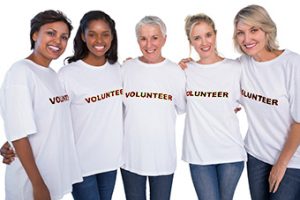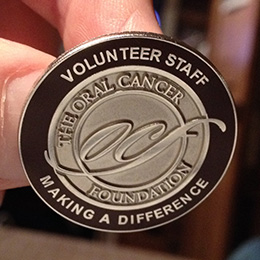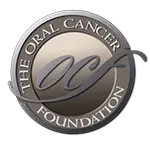
As a nonprofit organization, the Oral Cancer Foundation relies on the dedication and support of volunteers who selflessly donate their time, talent, and energy to help us achieve our mission of reducing the death rate from this disease through public awareness and early detection. This page will provide links to the OCF Regional Volunteers and related events in each geographic area.
You may contact the foundation directly at this link if you need additional information, would like to participate in OCF actively by becoming a registered OCF volunteer, or if you have a group that would like to co-sponsor an event with the Oral Cancer Foundation.
OCF conducts awareness and early detection events with dental schools, universities, hospitals, and other health and patient-related organizations. We also cooperate with a diverse group of private organizations that wish their club or group to be involved in contributing to charitable events. Groups as diverse as runners and cycling clubs to scouting and church groups can participate to help raise awareness and the early detection of oral cancers. We welcome partners who share our values and desires and wish to make a difference in the world around them through active participation in charitable events with The Oral Cancer Foundation.
Volunteering brings rewards
Volunteerism—whether through online forum participation, through educating the public, or through fund-raising efforts—can be an emotional healing agent, distracting oral cancer survivors, patients and caregivers away from lurking depression, giving them a cause to focus on. Volunteerism is also a bridge-maker, drawing diverse community members together, spreading awareness, and opening minds and hearts.
Volunteering definitely has been a benefit for me,” says survivor Barbara Boland of Philadelphia, Penn. “I have this other focus. I can say ‘Now I have a goal: I’m going to work on improving the five-year survival rate, help people to be diagnosed earlier.’ It helps me avoid the whole ‘Why me’ side, the depressive side.
Boland recently rallied her family members, co-workers, colleagues and friends to raise $15,000 to give toward a walk-a-thon staged in support of the Oral Cancer Foundation. The Walk for Awareness, produced by another survivor, cheer coach Minnie Ashworth of Chesapeake, VA, was held there in mid-April of this year. Long steeped in the spirit of volunteerism, Ashworth took on the challenge of producing the walk/run/screening event not only to raise money but to raise awareness about a disease that, despite its staggering toll, flies low under the public’s health-knowledge radar. The task was daunting: Ashworth had never produced a fund-raising event. But with help from her family, fellow survivors, and her doctors, Ashworth managed to stage not only the fund-raising walk, but an oral-cancer screening event as well.
I would guess there were 80 to 100 people in attendance with all of them getting oral screenings,” Ashworth says. “Daniel Karakla and Trad Wadsworth, my doctors, were there to do screenings along with Dr. Betsy Hagan, associate dean for clinics at the VCU School of Dentistry.
The doctors extended themselves at the event, Ashworth says. “They already have my respect, but they gained it twofold when they did more than just screen for oral cancer. They could have come, spent a couple of hours, and gone home. But they didn’t do that. They walked miles, talked to the other survivors, and made an impression on everyone there.”
Ashworth, who with her husband, Stacy, has ten children, surmises the event made a lasting impression on participants who are too young right now to appreciate the impact. During breaks in the screenings, the doctors involved did oral examinations on the young children in attendance, a group that would not normally be candidates for an oral cancer screening. “When I saw children as young as 8 or 9 getting screened, it hit me that these children would forever be educated on oral health, meaning they stand a better chance of catching oral cancer in the early, very curable stages,” Ashworth says. “Knowing that made me feel like we had made a difference, which was the goal of the day—to bring awareness to others.”
Those who battle or have already fought oral cancer and their caregivers often find themselves in a similar crusade. Among them is Daniel Bogan of Kaukauna, Wisconsin, who took a four-week break from chemotherapy so he’d be strong enough to participate in the Walk for Awareness, is a devoted advice and support giver on the Oral Cancer Foundation’s web-based Survivor/Patient Forum. In this place, those who are newly diagnosed can candidly talk with individuals who have been down the treatment path before them.
We don’t offer medical advice, since we’re not doctors,” Bogan stresses. “But we can offer our experiences… many of the issues that come up with oral cancer can be emotional in nature, many can be related just to the desire to know that you are not alone in what you are experiencing. In these areas, survivors can play an important support role.
When oral cancer patients find the survivor/patient forum on the Oral Cancer Foundation’s website, they often respond like they’ve found shelter from a maelstrom. “When I was first diagnosed with oral cancer, I’d never heard of it,” Bogan says. “Luckily, I stumbled upon the Oral Cancer Foundation online. I immediately joined—it was free—and two people called me immediately, people in similar treatment, and they told me what was coming up. It was like somebody threw me a lifeline.”
Information and encouragement from fellow survivors and patients help those newly diagnosed or undergoing treatment weather this most challenging period of their lives. Once they’re through treatment, many “graduate” and begin volunteering their time, effort, and emotions to others who need encouragement.
“I get emotional when I talk about posting on the board,” says Bogan, who has made friends from all over the world through advice seeking and giving. “The reason is I don’t feel like I ever can give back what I’ve taken. I want to help the foundation as much as I can. My main goal is to … to help take pressure off Brian (Hill, the Foundation’s founder) and become an extension of his mission. Brian and OCF want to promote early detection, and I can be a proactive part of that process.”
Early detection is the grail of those who give their time to help spread awareness about oral cancer. Many tell stories of being turned away by doctors and dentists who pooh-poohed their patients’ concerns. They tell of having to badger a diagnosis out of the medical or dental systems. “I went to the dentist because I had a back tooth that was loose,” relates Ashworth. “He said, ‘It’s gone bad. Let’s go ahead and take it out.’ He had an X-ray of my jaw. It was right there in his face. I look at the X-rays now, and it’s visible that a tumor had consumed half my jaw. But I went undiagnosed for four more months and that’s a long time to have cancer floating around in my body.”
Bogan’s story is similar: “I went to the doctor three times,” he says. “He blew me off like it was nothing. The third time I returned with complaints, they finally diagnosed me with Stage 4 cancer.”
Boland, a dental practice management consultant who previously worked as a dental hygienist, has an advantage over much of the general public: she knew about oral cancer. And she knew that when an abnormality cropped up in her mouth, it wasn’t something she should ignore just because she wasn’t a textbook case of a person at risk for the disease.
I got oral cancer without having any of the risk factors,” Boland says. “I never smoked, I was not more than a social drinker, and I was age 41 at the time of my diagnosis.” Boland was one of the lucky few who are diagnosed at Stage 1.
She credits her persistence. But she, Bogan, and Ashworth, who all devote hours to the Foundation’s patient/survivor forum, all volunteer in the hope that Stage 1 diagnosis will be the norm rather than the exception in the future.
Besides participating on the Foundation’s interactive support board, Ashworth produced the Virginia Walk for Awareness.
“Organizing the walk was a learn-as-you-go process for me,” she says. “I haven’t done something of this magnitude before, so I felt my way along. Brian (Hill) provided a ton of sage advice, so I had his support the whole way.” Her large family, right down to her 5-year-old grandchild, pitched in to help. “My family made this event happen, not me alone,” Ashworth says. “From spending afternoons hanging posters, addressing close to 500 postcards to dentist offices, picking up tables and chairs, putting up with me on the phone more than usual, they helped me get it all in place.”
Bogan raised walk sponsorships and then flew in from Wisconsin with his wife, Marcee to support Minnie’s OCF walk in Virginia. “ I met personally with all those who sponsored my walk effort and pledged a dollar amount per mile I walked. I told them why it was important to me,” he says. “And to my knowledge, 100% sent their funds in.” He puts in the hours supporting fellow patients and the Foundation because it gives him a mission. “I feel active about promoting the Web site and early detection,” he says. “If my efforts can save one person….”
The effort to save even one person from going through what they’ve experienced keeps these volunteers moving forward.
Boland takes advantage of the access to dentists her career gives her. In her own time, she speaks to groups of doctors and dentists about procedures they can adopt in their routine practice to improve the rate of early detection and increase the five-year survival rate for oral cancer. Her efforts have begun to pay off. “In the past six months, among the dentists I’ve spoken with, and where we’ve implemented a formal early detection program, they’ve diagnosed two pre-cancerous lesions and one Stage 1 cancer.”
Those diagnoses made all her work worthwhile, Boland says. And her volunteer efforts have given her a surprising perspective on her life’s path. “Because I work in dentistry and got oral cancer … it’s like God said, ‘OK, do something. Here’s your purpose in life.’ I just figured that was what the plan was somehow. I’m happy to have a way to use cancer for a good thing. I never thought I would say that my cancer could be turned into something positive, but it has. I can say that I played a role in the fact that three other people will never have to have radiation therapy. I can say I played a role in that. I trained those dentists, and that feels good. … That feels good.”

The foundation encourages others to engage in the effort to raise public awareness and encourage the development of an annual oral cancer screening program in professional offices, such as dentists ENTs, hygienists, and other medical professionals. Your contribution might be as simple as helping produce content for the website, writing letters to people who may be in a position to help the foundation, to raise funds for the foundation’s efforts, or even putting on a walk or screening event in your community. The possibilities are endless for those that have a passion for helping others. And the ideas that have helped are very diverse. A father and son hike a long mountain trail for days to raise money in memory of a grandparent. A youth dance troupe puts on a recital event to raise funds for an awareness program. A motorcycle club rides to raise awareness. A group of professional musicians performed a concert to raise funds and public awareness. A bachelor auction in 2006 raised $7,000 to help OCF print awareness and information brochures. And these are only a few of the ideas that volunteers have come up with. You, too, could be part of making a positive change in the world. Contact the foundation. It will change your life and that of others… perhaps even save a life.



